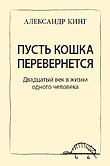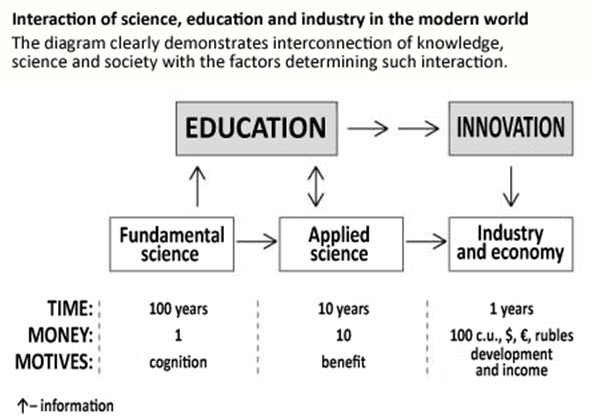 |
|
||||||||
|
|
|||||||||
 |
|
|
A.King "Let the cat turn round". Opening RemarksMemoirs of Alexander King are devoted to events of the 20th century. At the beginning of this masterfully written book the author turns to his childhood and youth, when early received the degree of PhD, Russian equivalent of candidate of sciences, King followed the usual path of a young scientist that traditionally combines research and teaching. However, World War II began. At this decisive moment in the history and biography of Alexander King it began his career as a scientist and science coordinator, councilor and diplomat. The scientist who, before many, realized the place and importance of science and technology in the military arts, and then in the modern, already globalized world. This is precisely the meaning and role of Alexander King. No wonder the last big thing, which so manifests his personality and experience, was the Club of Rome. Founded by Italian industrialist Aurelio Peccei, the club, which has nothing to do with Rome, and the club is not a club in the usual sense of the word, was to become the Council of experts of international recognition, which was for the first time offered to have a look into the future of humanity.
Experience of the Club of Rome was subject to fair criticism, and many of the results have not passed the test of time. But undoubtedly his credit is the statement and understanding of global issues. It is therefore the author's experience is so instructive whose work coincided with the most dramatic phase of the 20th century. This book is not only and not so much a life description of an outstanding man, but is the last major thing of Alexander King. A modern reader related to the management of science should be interesting the generalization of the author's experience and his analysis with the participation in the organization of science in the new world where it is so much expected from the world science in addressing issues raised before humanity in the recent past. This is the meaning of the metaphor of the Academic Cat that will have to finally turn towards the needs of society, so vividly described by Alexander King.
Concluding RemarksThe light of extinguished stars in the vastness of our galaxy is observed as it is known posthumously. And it is the same with the great thinkers: their thoughts and memory of their lives live behind the horizon of time given to them. But only if it is fixed in oral, written or other (in architecture, institutes, paintings, music) form of human memory. Alexander King has left his view on his life in this book. It reflected the 20th century, almost fully comprehended by the author. Reading into the lines of such book is instructive, entertaining, and most importantly - such reading is guaranteed to leave traces. Among the millions of books left by the authors, such is a little. And each of these books is unique. Unique experience of a man who was the founder of one of the most intellectually powerful network structures of the last third of the 20th century. In the writings of the Club of Rome concern, anxiety, and pain of experts is fixed such way as it has never been accepted before. In fact, the Club of Rome was born with pain for humanity that has put itself on the brink of ecological disaster by its technogen expansion. The "Limits to Growth" was a shock, the severity of which is still relevant half a century later. The whole library of works of the Club of Rome captures the subjects of global importance. Equally global in the scope of thought was the president of the Club of Rome, Alexander King. In this globality human qualities were organically and originally inlaid. And King's predecessor as president, co-founder of the Club of Rome Aurelio Peccei, in the book under the same name realized fundamental link of ethics, science, technology, economics and politics. In Alexander King's book this node of human life is conceived with the Ecclesiastic sadness. Understanding the tremendous power of science and technologies, including for military purposes, King found himself in the role of Vladimir Vernadsky, " who due to the "time machine" suddenly saw pathological result of the planetary activity of humanity reached the status of geologic forces. The resultant noosphere, the best forces of which are still working to achieve military superiority and too often do not look back or particularly peering at direct and side effects created by them, is found to be far from the romantic ideal. Motives that drive the creation of factories and works, discoveries and innovations, alliances and clashes have dictated tragic events in the history of the century. Then nature of motives and types of personalities are recognizable by the fruit. Without reanimation of conscience the future is monstrous and development, not blessed by a moral imperative, is suicidal - the core of King's deliberations may be formulated so. The fact that the economic and technological growth has resource limits has become quite obvious, although an occasionally disputed thesis. But the realization of the fact that these limits have their order parameter - morals, despite its triviality on its face, has not become a paradigm at all. The crisis of 2008 and the following years, many still interpret in financial terms, manifested itself even more seriously as a crisis of the technological platform of the modern economy and the collapse of the prevailing moral values of being - practices of greediness, selfishness, irresponsibility and aggression. The book about the Academic Cat that turned round has become according to Professor Kapitsa who was well familiar with the author, the last major thing of Alexander King. And this thing is quenchless. The book powers the present generations, who is to make a great turn. You will not succeed in reading this book just as a book. Only if imagine a car of express train dashing through the tunnels, into the distance, for new meetings and horizons to new thoughts and feelings - the only way, imaging a compartment with a lone companion, who is telling you about his life. This conversation partner can only be listened without interrupting. Harking. Gratefully. Professor Alexander Ageev
Publication date: 2012.09.28 |
|
|||||||||||||||||








